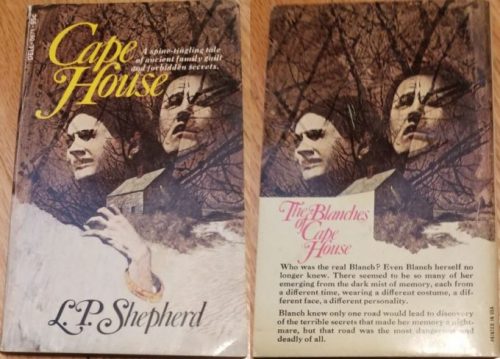L. P. Shepherd, author of Cape House, was my college creative writing professor. Although I was primarily interested in only writing fiction at the time, Dr. Shepherd had the class writing poetry, plays, memoirs, essays, short stories, and non-fiction. I didn’t care for that initially, but by the end of the term I saw how each assignment helped me improve my fiction writing as well as my writing overall.
In my experience, Dr. Shepherd was a curmudgeonly type, recalcitrant with his praise, but when he said offhand while discussing one of my writing assignments that I “had some talent” that was enough encouragement to give me confidence in my writing. I am positive that he helped other students as well, as the college community created an annual scholarship in his name to honor him that it is still awarded to deserving students today.
Cape House, his only published novel, was released in paperback in 1974 by Dell Publishing, now a part of Random House. The front cover calls it “A spine-tingling tale of ancient family guilt and forbidden secrets.” The back cover provides the log line: “The Blanches of Cape House — Who was the real Blanch? Even Blanch herself no longer knew. There seemed to be so many of her emerging from the dark mist of memory, each from a different time, wearing a different costume, a different face, a different personality. Blanch knew only one road would lead to discovery of the terrible secrets that made her memory a nightmare, but that road was the most dangerous and deadly of all.”
Personally, I found Cape House to be a well-written, atmospheric novel with well-developed, though sad, characters. Admittedly, gothic is not my preferred type of story. I did enjoy how he used atmosphere to build the feeling of unease and anticipation throughout.
Cape House is included in Gothic Novels of the Twentieth Century: An Annotated Bibliography by Elsa J. Radcliffe, Scarecrow Press 1995, in which Radcliffe provides some brief biographical information about L. P. Shepherd, noting that he was “Born in St. Louis, Missouri. Received a B.S. from Kansas State Teachers College in 1961 and an A.M. from Columbia University [and worked] as an English [professor] and lives in Fitchburg, Massachusetts.” Dr. Shepherd passed away in 1988.
Interestingly, Radcliffe also included her own very brief reviews of the novels listed in the bibliography. In her two-sentence review of Cape House, she said that she liked the “good ghosts,” but did not enjoy his writing style nor how he ended the story. Oh well, as Dr. Shepherd would often say when discussing an individual’s opinions of writing and art, “de gustibus non est disputandum,” or translated to English, “in matters of taste, there can be no dispute.”


